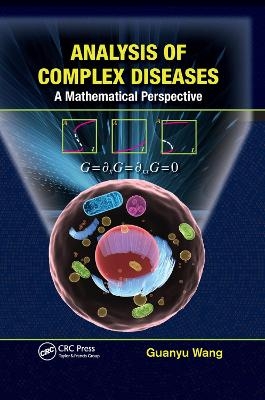
Analysis of Complex Diseases
CRC Press (Verlag)
978-0-367-37900-1 (ISBN)
Focusing on diseases related to cellular energy metabolism, such as cancer and diabetes, Analysis of Complex Diseases: A Mathematical Perspective presents a holistic approach for illuminating the molecular mechanisms of these diseases and the evolutionary underpinning of their simultaneous epidemics. Using mathematics to identify patterns of deviation from normality, or the healthy state—spanning multiple levels from molecules to the organism—the author identifies a range of dynamical behaviors that correspond to either cellular physiology or pathology. He uses the information from multiple levels in order to develop a unified theory, which includes the discovery that certain diseases may stem from well-evolved, useful mechanisms activated in the wrong context.
This book is divided into three parts. Part I focuses on the organismal level to describe normal physiology and how the body as a whole meets its functional requirements. Part II addresses the subcellular, molecular level to elucidate the organizing principles of cellular biomolecules to meet the demands of the organism. Part III examines complex diseases by combining information from the organismal level and the molecular level, offering a paradigm that can be extended to the study of other categories of diseases.
Guanyu Wang obtained one PhD (in engineering) from Zhejiang University, China, in 1998 and one PhD (in medical sciences) from the University of Cologne, Germany, in 2005. As a postdoctoral fellow, he was initially at the School of Health Information of the University of Texas Health Science Center at Houston and then at the Department of Bioengineering, Rice University. He was an assistant professor of Pathology and Laboratory Medicine at the University of Texas Health Science Center at Houston and then an assistant professor of Physics at George Washington University. He is now an associate professor of biology at South University of Science and Technology of China, located in the city of Shenzhen.
Organismal Level: What Is Required. Food Intake and Energy Metabolism. Glucose Homeostasis. Optimal Glucose Homeostasis. Bistability as a Fundamental Phenomenon. Molecular Level: What Can Be Provided? Molecular Biology. Biomolecular Network. PI3K-AKT-TOR Pathway. Mathematical Analysis of Complex Diseases. Diseases Related to Metabolism. Mathematical Modeling of the PI3K-AKT-TOR Pathway. Fundamental Decomposition. Normal Phenotype. Disease Phenotypes. Tao of Diseases. References. Abbreviations. Appendix A Optimization of Insulin Action. Appendix B Derivation of the Master Equation of AKT Activation. Appendix C Singularity Theory. Appendix D Analysis of the Simplified Master Equation. Appendix E Analysis of the Master Equation. Index.
| Erscheinungsdatum | 30.09.2019 |
|---|---|
| Verlagsort | London |
| Sprache | englisch |
| Maße | 156 x 234 mm |
| Gewicht | 453 g |
| Themenwelt | Mathematik / Informatik ► Mathematik ► Angewandte Mathematik |
| Medizin / Pharmazie ► Medizinische Fachgebiete | |
| ISBN-10 | 0-367-37900-7 / 0367379007 |
| ISBN-13 | 978-0-367-37900-1 / 9780367379001 |
| Zustand | Neuware |
| Informationen gemäß Produktsicherheitsverordnung (GPSR) | |
| Haben Sie eine Frage zum Produkt? |
aus dem Bereich


